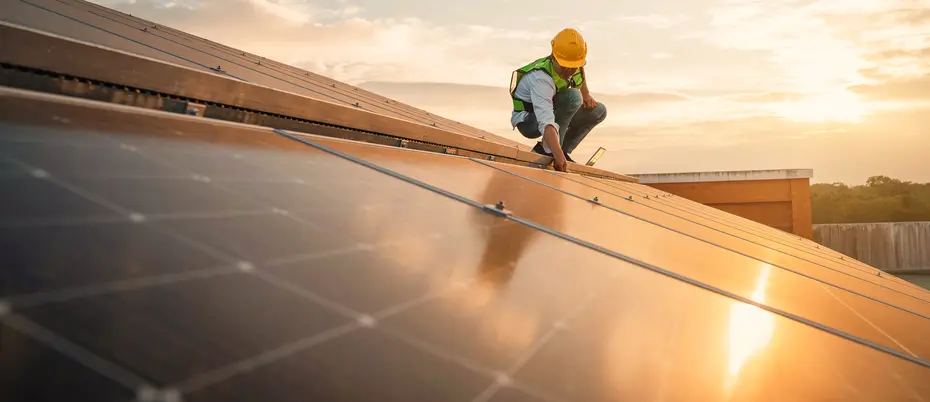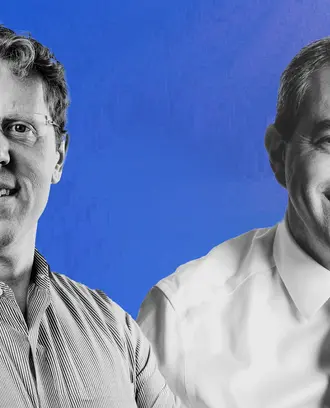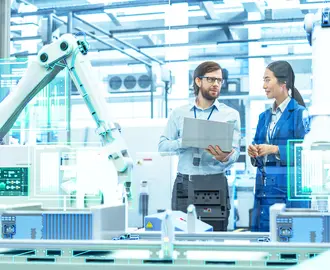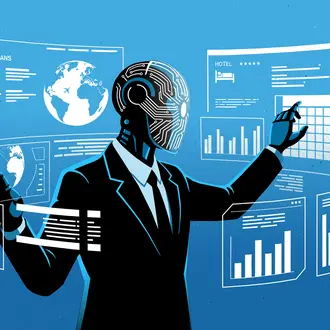Future of Work
Workers need good jobs. The climate sector can help
The U.S. is experiencing a crisis around job quality. Emerging climate jobs can give workers a living wage, health care, and safe working conditions.
Facing low wages, poor working conditions, and a lack of training, a third of working Americans can’t afford their basic needs. The transition to a sustainable economy represents a unique opportunity to address those challenges and create fair, well-paying jobs — even amid freezes to federal funds intended to support the growth of such roles.
Clean energy is a sector “where there are huge needs both for the climate issue and for our country’s workforce development,” said MIT Sloan professor , co-director the MIT Institute for Work and Employment Research.
At an April event hosted by IWER and the MIT Sloan Sustainability Initiative, Kelly and guest speaker Jenny Weissbourd, MBA ’18, a program director with the nonprofit Families & Workers Fund, discussed what a “good job” means in the 21st century.
In conjunction with business, policy, and labor organizations, the Families & Workers Fund developed a working definition stating that good jobs should:
- Pay enough for workers to sustain their families.
- Provide numerous chances for advancement.
- Create opportunities for agency in the workplace.
Over the past four years, the Infrastructure Investment and Jobs Act, the Inflation Reduction Act, and the CHIPS and Science Act collectively pledged about $2 trillion in climate and infrastructure projects.
Those laws were projected to create about 12 million new jobs, which Weissbourd characterized as “an enormous window of opportunity to really support the transition to net zero while also moving workers into these higher-quality jobs.
“As it relates to the infrastructure and climate investments, we know that many of those dollars are now on hold, but many have already moved toward the ground, and we really want to make sure that they effectively support a clean energy transition,” Weissbourd said.
The pause in funding comes at a time when the climate crisis is creating “new vulnerabilities for people who are perhaps not fully covered by existing labor standards or for whom pushing for enforcement of existing labor standards feels risky,” Kelly said.
Even so, Kelly and Weissbourd expressed optimism that growth in climate jobs could help the country move toward a sustainable economy if policy and advocacy were to center around the following issues.
1. Economic stability
Many jobs, including some climate jobs, don’t provide enough money to change people’s economic realities, Weissbourd said.
“There’s a crisis around job quality,” she said. “I've talked to solar panel installers who have part-time work who don’t get benefits, who are out there on the roof every day facing extreme weather.”
Related Articles
Givng people the opportunity to earn enough money to support their families, receive health benefits, and work in safe conditions with a good schedule would move the needle on economic mobility.
The Families & Workers Fund, for example, supports PowerCorpsPHL, a Philadelphia-based organization that connects young people, including those who have been involved with the legal system, to quality green infrastructure jobs, such as climate resilience work in the city’s water department or its parks and recreation department.
“What they get is effective paid training, along with a set of other wraparound supports [and] mental health support, helping participants connect with things like transportation and child care, which we know can often stand in the way of successful completion of a training program and success in a job,” Weissbourd said.
“As a result, more than 90% of the people that go through this training program end up not just connecting to a living-wage quality job but staying in that job and advancing in that job over time.”
2. Economic mobility
Good climate jobs should also offer clear pathways for advancement, paid training, and wealth-building opportunities. “When you invest in the workforce, it helps you attract and keep talent; it helps drive engagement and productivity,” Weissbourd said.
She said that while federal funding for job training isn’t going away altogether, “I think we can expect a much smaller-scale investment than [in] the last few years.”
In this economic climate, it’s imperative that other parties get involved — not just the government, but private business and workers themselves, too.
“It’s about really showing the value to each of the stakeholders of this work,” Weissbourd said. “We have to be talking to the private sector because they’re providing many of these jobs and we have to be demonstrating to companies that [good jobs are] in their business interest.”
3. Equity, respect, and voice
Good jobs should provide equal opportunities and address discrimination where it exists.
“Clean energy jobs haven’t always included women and people of color,” Weissbourd noted. “There’s lots of great research on how diversifying your workforce can lead to really important business benefits.”
Add in a historic labor shortage and high rates of retirement in the workforce, and “it’s imperative to attract people from all walks of life,” Weissbourd said.
Kelly said that it’s important for workplaces to engage in open conversation: As we increasingly talk about what a good job should consist of, people can start to expect more for their futures.
“The more that there is organizing via labor movements of all kinds, as well as policy initiatives, then there’s a sense of being ready to push,” Kelly said.




